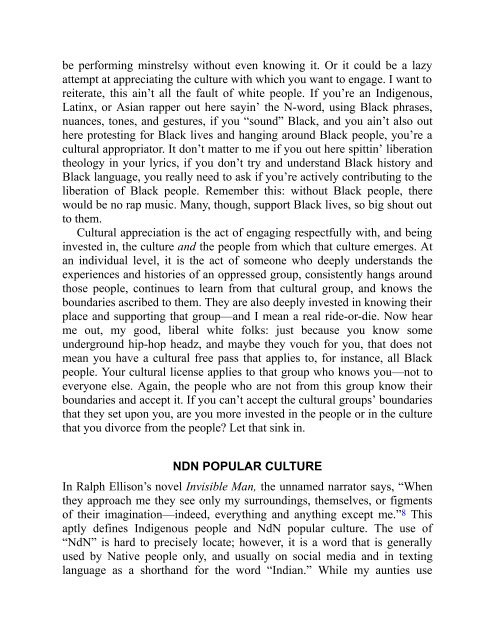You also want an ePaper? Increase the reach of your titles
YUMPU automatically turns print PDFs into web optimized ePapers that Google loves.
e performing minstrelsy without even knowing it. Or it could be a lazy<br />
attempt at appreciating <strong>the</strong> culture with which you want to engage. I want to<br />
reiterate, this ain’t all <strong>the</strong> fault <strong>of</strong> white people. If you’re an <strong>Indigenous</strong>,<br />
Latinx, or Asian rapper out here sayin’ <strong>the</strong> N-word, using Black phrases,<br />
nuances, tones, and gestures, if you “sound” Black, and you ain’t also out<br />
here protesting for Black lives and hanging around Black people, you’re a<br />
cultural appropriator. It don’t matter to me if you out here spittin’ liberation<br />
<strong>the</strong>ology in your lyrics, if you don’t try and understand Black history and<br />
Black language, you really need to ask if you’re actively contributing to <strong>the</strong><br />
liberation <strong>of</strong> Black people. Remember this: without Black people, <strong>the</strong>re<br />
would be no rap music. Many, though, support Black lives, so big shout out<br />
to <strong>the</strong>m.<br />
Cultural appreciation is <strong>the</strong> act <strong>of</strong> engaging respectfully with, and being<br />
invested in, <strong>the</strong> culture and <strong>the</strong> people from which that culture emerges. At<br />
an individual level, it is <strong>the</strong> act <strong>of</strong> someone who deeply understands <strong>the</strong><br />
experiences and histories <strong>of</strong> an oppressed group, consistently hangs around<br />
those people, continues to learn from that cultural group, and knows <strong>the</strong><br />
boundaries ascribed to <strong>the</strong>m. They are also deeply invested in knowing <strong>the</strong>ir<br />
place and supporting that group—and I mean a real ride-or-die. Now hear<br />
me out, my good, liberal white folks: just because you know some<br />
underground hip-hop headz, and maybe <strong>the</strong>y vouch for you, that does not<br />
mean you have a cultural free pass that applies to, for instance, all Black<br />
people. Your cultural license applies to that group who knows you—not to<br />
everyone else. Again, <strong>the</strong> people who are not from this group know <strong>the</strong>ir<br />
boundaries and accept it. If you can’t accept <strong>the</strong> cultural groups’ boundaries<br />
that <strong>the</strong>y set upon you, are you more invested in <strong>the</strong> people or in <strong>the</strong> culture<br />
that you divorce from <strong>the</strong> people? Let that sink in.<br />
NDN POPULAR CULTURE<br />
In Ralph Ellison’s novel Invisible Man, <strong>the</strong> unnamed narrator says, “When<br />
<strong>the</strong>y approach me <strong>the</strong>y see only my surroundings, <strong>the</strong>mselves, or figments<br />
<strong>of</strong> <strong>the</strong>ir imagination—indeed, everything and anything except me.” 8 This<br />
aptly defines <strong>Indigenous</strong> people and NdN popular culture. The use <strong>of</strong><br />
“NdN” is hard to precisely locate; however, it is a word that is generally<br />
used by Native people only, and usually on social media and in texting<br />
language as a shorthand for <strong>the</strong> word “Indian.” While my aunties use


















